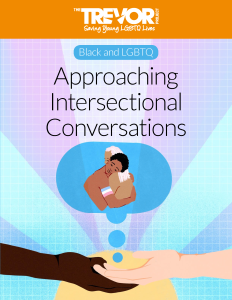LGBTQIA+
The Trevor Project
The Trevor Project’s mission is to end suicide among LGBTQ young people.
Connect with a counselor 24/7/365
It Gets Better Project Help Guides and Resources
The It Gets Better Project is a nonprofit organization with a mission to uplift, empower, and connect lesbian, gay, bisexual, transgender, and queer youth around the globe.
Black and LGBTQ: Approaching Intersectional Conversations
Resource on discussion starting points from the Trevor Project. If you’re considering engaging with people who identify as non-Black in your life about your identities, it’s important to remember that the process of having difficult conversations does not begin or end with the discussion itself. It is essential to consider your well-being and safety at each step in the journey. Here are some approaches to consider before, during, and after a difficult conversation to make sure the dialogue—and your mental health—stays safe.

Trans Lifeline
Trans Lifeline connects trans people to the community support and resources the Trans community needs to survive and thrive.
LGBTQIA+ Youth Resources from the Centers for Disease Control and Prevention (CDC)
The CDC, government agencies, and other community organizations for LGBT Youth, their friends, educators, parents, and family members have provided a number of resources to support positive environments.

